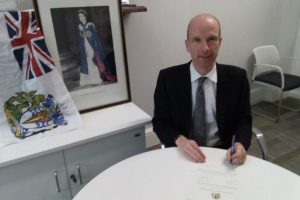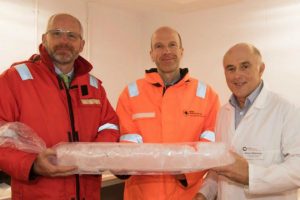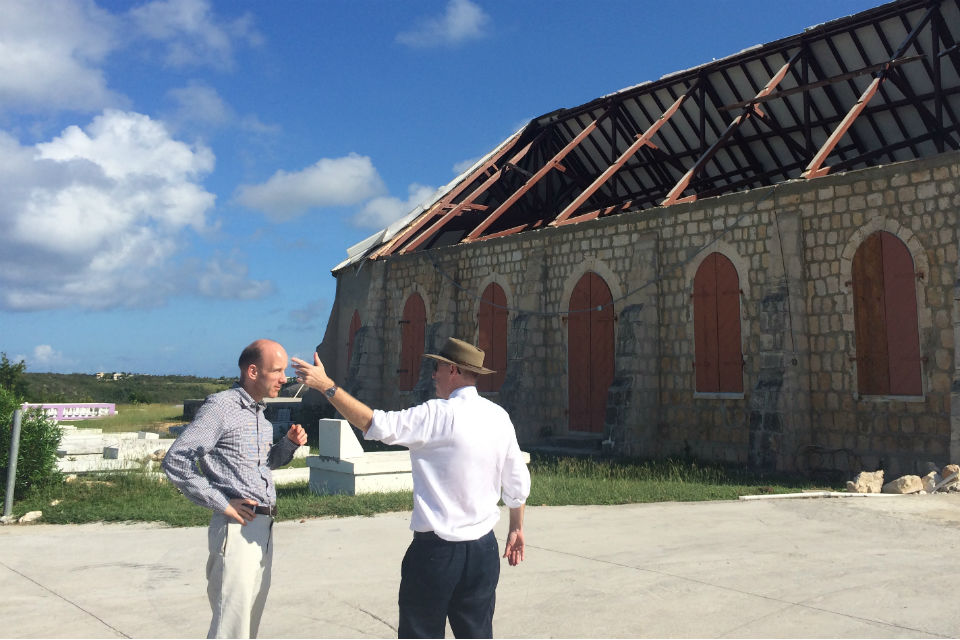
I am registered blind, I can’t read hard copy unless hugely magnified (my computer has a voice synthesiser which reads everything to me, but I can’t skim read), and I can’t recognise faces or drive. I’m one of FCO’s disability role models (on loan from MOD).
In March I blogged about what being a disability role model meant to me. Since part of role-modelling is about (hopefully) inspiring others and demonstrating what’s possible, I wanted to take the opportunity of the recent International Day of Disabled People on 3 December, to talk about what I’ve done this year and especially about my reflections on resilience following Hurricane Irma.

When I last blogged, I was Deputy Director of the Overseas Territories Directorate in the Foreign & Commonwealth Office. A few months later, and with all I’d learnt on the Senior Leaders Scheme to support me, I decided to put my hat in the ring for promotion. And I was lucky enough to get it. I now have what I regard as one of the best jobs in the Civil Service – I am the Director Overseas Territories (OTs), and Commissioner for the British Indian Ocean Territory (BIOT) and the British Antarctic Territory (BAT). I’m hugely enthusiastic about the role and find all our work genuinely fascinating, especially the history, geography, political, economic, social and environmental issues of the OTs.
I get to work with a wide range of dedicated and impressive people – colleagues in Whitehall, the governors and governments of the OTs, and many others. And I get to support the delivery of a very wide range of important and tangible improvements for the people of the OTs through all those colleagues, including better public financial management, better child safeguarding, and better aviation security and marine protection.

As Commissioner for BIOT and BAT, I’m also responsible for the sound stewardship of an archipelago of 55 islands and an area of the Antarctic that’s six times the size of the UK. We’re always on the look-out for good people to work for us, so do get in touch if you’re interested.
The OTs were in the news this summer with the massive devastation that Hurricane Irma wrought on Anguilla, the British Virgin Islands and the Turks and Caicos Islands.
One month into my new role, I found myself involved with one of the broadest and most complex crises that the FCO has dealt with. I was one of the main ‘Gold leaders’ for the first time, in charge of the operation in the FCO’s Crisis Centre, and my blindness could have been a considerable problem.
As a mark of the scale of the operation, we had 400 people working in the Crisis Centre at one point or other in the nearly three weeks of the Irma crisis. At its height, there were 145 people working there in one 24-hour period. There was also an explosion of e-mails and other information, constant phone calls, briefings, COBR meetings and the rest.

But disabilities can often give you unexpected advantages. As I noted in my first blog, going through disablement and coming out the other side leaves you able to cope with much that life has to throw at you. I took three approaches;
- Be self-aware, and clear with others on how best to work together
There was no way I could possibly identify the huge range of people involved in the crisis. So at the start of every shift, as well as setting out the strategic issues, I told everyone about my disability and said they should just introduce themselves to me each time, rather than assuming I would knew who they were. A simple point, and it worked fine.
Similarly, keeping on top of the in-box was quite impossible, so I got various team members to flag when really important e-mails came in. The system wasn’t foolproof, but it was pretty good. You can’t always get what you want, as someone once observed, but if you try sometimes, you just might find, you get what you need.
- Accentuate the positives, and focus on the big picture
It would have been easy to be weighed down by the pressure. But I’ve found that in the face of great challenges, concentrating on the good things that one has is by far the best approach. And as a senior leader, I spend a lot of time thinking about how best to create a positive culture, and focusing on the ability to listen to others that my blindness gives me. This is especially important where there is the risk of being overwhelmed by one’s to-do list; and lifting your eyes to focus on the small number of things that really matter is fundamental. To borrow from the musical Hamilton – “Talk less, smile more, don’t say what you’re against but what you’re for.”
- Prioritise your and your colleagues’ well-being
There’s a real danger of the ‘warming the frog’ syndrome, where we allow ourselves to take on increasingly more over time till we get burned out. But we all looked out for each other and tried to ensure everyone was taking proper breaks between shifts. I recommend the MIND guidelines on well-being – promoting resilience and well-being among my colleagues underpins all that I do.
So, it’s been a varied and challenging year, and one that makes me very proud of all the hard work that my colleagues and I have done. I’m also honoured to have just been asked to champion the cross-Civil Service Visual Impairment Network. I constantly strive to push myself and test what I can do, despite my disability, and hope this blog gives a sense of what’s possible.

7 comments
Comment by Gavin Thomas posted on
Hi Ben, Happy New Year! Thank you for a great article, which I hope will provide inspiration to others. I would also agree that it also very much depends on the attitude and understanding of others if we are to ensure that we have an inclusive workplace.
Comment by Steven Mark Langley posted on
Hi Ben, great article, very inspirational and shows a fantastic attitude and strength. I am registered blind and it has not always been plain sailing throughout my civil service career, but you have shown it is how one handles every challenge that counts. Giving up is never an option and great support from management always helps. But one's own attitude and outlook has to be positive. We definitely share those traits. All the best in your role and also in your new supportive role of cross- government role as the visually impaired champion.
Comment by Benedict posted on
Great blog; looking forward to the next issue!
Comment by Brian Aungles posted on
Thank you for sharing your story. It is such a shame that stories like this only appear to comme from the SCS. As a disabled AO I have had nothing but barriers and management trying the same thing that didn't work the year before. We all have a lot to give, such a shame that disability and the challanges that it brings are used are often used to hold people back.
Comment by Charlotte Smith posted on
A fascinating read. Especially as i have monocular vision in addition to oter disabilities, and have an appreciation and understanding of the challenges that blindness brings. Thank you for sharing your story.
Comment by Joyce posted on
What an interesting and inspiring blog!
Thanks for sharing your experiences.
Comment by Frances posted on
Really fantastic blog, thanks for sharing your story.